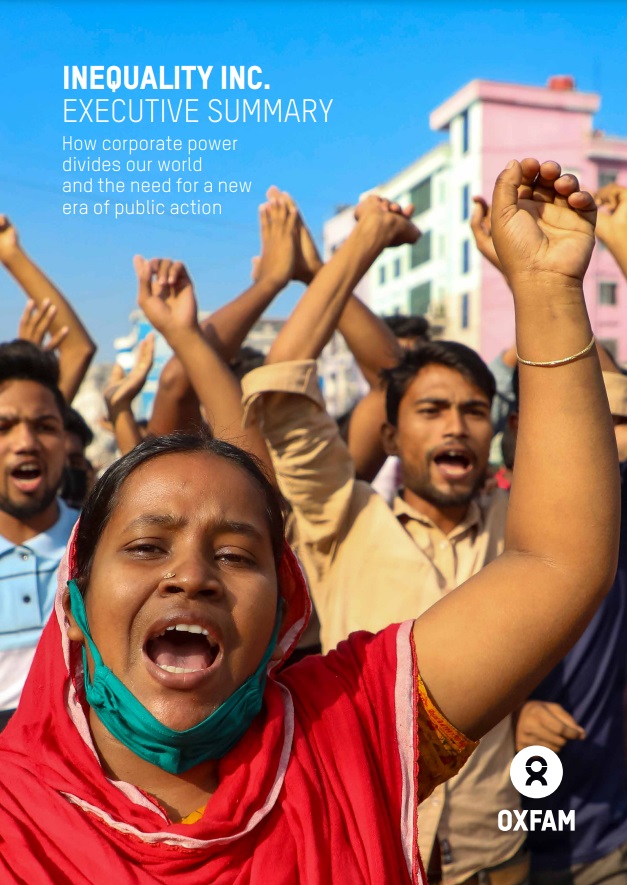Corporate power is driving up inequality. This is how to make corporates work for the common good instead – this year’s Oxfam Davos report

Oxfam’s annual ‘Davos Report’ has become a bit of an institution. In response to last week's megarich schmoozathon, Anthony Kamande introduces the main findings of the 2024 version. Full paper here.
Last Christmas eve, my cousin Lucy came to my rural village. She needed some help. Lucy’s son had excelled in the national exams and was selected to join a mid-level public high school. Knowing all too well the conditions of our public education in Kenya, he must have had put in a lot of handwork and dedication to get that far. Unfortunately, all that dedication and hard work is about to go down the drain as Lucy explained, through tears, that she has no money for the school fees. As someone who went through a similar situation, I totally understood how depressing this must be for Lucy and her son.
Countless children from developing countries are being robbed of their dreams because of underfunded public schools. That has created a perfect opportunity for those who want to cash in. In Kenya, private schools have surged over the last few years. But this is just part of a bigger issue: the commercialisation of essential public services. It is a lucrative business practice that is creating and perpetuating massive inequality.
 As the world’s wealthiest people and their enablers meet in Davos this week, Oxfam’s report, Inequality Inc., released this week, looks at how the wealthy use corporate and monopoly power to enrich themselves. The report shows how corporate power is the driving force behind rising inequality and stands in the way of providing essential public services like education and ending poverty. But it also details how corporations can work for the common good. That requires the reinvention of the state. I was part of the team involved in producing the key numbers in this report. Some are mind-boggling.
As the world’s wealthiest people and their enablers meet in Davos this week, Oxfam’s report, Inequality Inc., released this week, looks at how the wealthy use corporate and monopoly power to enrich themselves. The report shows how corporate power is the driving force behind rising inequality and stands in the way of providing essential public services like education and ending poverty. But it also details how corporations can work for the common good. That requires the reinvention of the state. I was part of the team involved in producing the key numbers in this report. Some are mind-boggling.
Five versus five billion
We start by looking at the winners and losers. The world’s wealthiest continue to reap massive profits, but billions of those at the bottom are losing out. In 2023, the world’s billionaires had a sumptuous year. Between them, they added US$1.2 trillion in real terms, a massive jump in their already colossal wealth. If they distributed this gain to everyone on earth, you would each get about $150. In my rural village, that is a decent sum to keep a family going for up to three months.
The richest of the richest were the happiest lot (at least, if money buys you happiness). As of the end of November 2023, after taking inflation into account, the five wealthiest men were $465 billion richer than they were in 2020, having more than doubled their wealth. This gain is enough to end global extreme poverty 11 times over. On the other hand, billions of the world’s poorest people went the other way, with five billion people’s wealth falling since 2020.
How corporate power is creating and exacerbating inequality
Corporations and monopoly power are behind the massive gains of the world’s wealthiest people. In our report we reveal that seven out of the ten biggest corporates in the world have a billionaire CEO or a billionaire as the principal shareholder. The unfair distribution of the company profits is hugely concentrating economic power in the hands of the few. Oxfam’s report shows that for the year to June 2023, 148 of the world’s biggest 200 companies made a record $1.8 trillion in net profit. But most of these profits were returned to the rich shareholders and wealthy executives; for every $100 of profit made by 96 of the 200 world’s biggest companies, $82 was returned to rich shareholders in the form of dividends and share buybacks (where a corporate uses profits to drive up the price of its shares).
The report identifies four ways in which the richest ensure that the corporations they control drive up inequality: rewarding the wealthy instead of workers, tax avoidance and evasion, privatisation of essential public services and driving climate meltdown. Start with the first one.
Corporations are undercutting the workers in the race to maximise profits for their wealthy shareholders and executives. Over the past couple of years, companies have been directing their profits to the wealthy instead of distributing them fairly, resulting in a decrease in workers’ wages. Over the past two years, nearly 800 million workers around the world saw a $1.5 trillion cut in their pay, handing corporates the equivalent of a month of free labour. Falling unionisation, precariousness in the labour market, and corporate use of their power to oppose policies and laws that benefit workers have given the wealthy the upper hand.
Lobbying for low corporate taxes, tax evasion, and avoidance is the second trick up the corporate sleeve. Since 1980, corporation tax has fallen in most countries. This has particularly affected poorer countries like Kenya, whose substantial revenue is derived from corporate tax. Governments need money to provide quality, accessible and universal essential services, like education for Lucy’s son. But without sufficient tax revenue, governments have resorted to irresponsible borrowing, which, again, corporations and their wealthy owners are lending at bankrupting interest rates, worsening the situation.
Third, the wealthy are enriching themselves by commodifying and commercialising essential public services like education, healthcare, water, and other public infrastructure. This further entrenches inequality as only those with money can afford these services, while most, like Lucy’s son, suffer.
The fourth way is by driving climate breakdown. The richest are the biggest emitters of greenhouse gases. However, those least able to withstand its most harmful effect bear the disproportionate burden. Unfortunately, these same contributors to climate change are the ones in charge of shaping the green transition, often blocking progressive policies that could protect our planet.
Curbing corporate power requires a strong and functional public sector
But as the report shows, humanity has overcome corporate greed before. By revitalising and transforming the public sector, we can once again ensure that corporations serve the greater good. Here are three practical steps.
- The state must urgently reclaim its crucial responsibility as the provider of essential public services, like education, water and other public infrastructure. The state should reinvent and empower public institutions. It should improve accountability and transparency in public institutions to improve efficiency, service delivery and public trust.
- Governments should work to break the corporate monopoly, a considerable hindrance to innovation, job creation and competitive prices. Empowering workers by implementing progressive labour policies, including supporting unionisation and setting up a living wage or minimum wage, would ensure a fair distribution of companies’ profits. Adequately taxing corporations and wealthy individuals will help to drastically dilute corporate power and the influence of the rich. It will also provide governments with much-needed resources.
- There is an urgent need to repurpose the private sector that is not solely based on maximising shareholder income. Governments should support new business models that put workers and community first and that protect our environment. Governments can use numerous tools, such as procurement and financial support to support new businesses.
Without urgent action to reign in corporate power, it will be impossible to end poverty, protect our planet from destruction and secure our democracy and public institutions from elite capture. The state must reclaim its responsibility. Hopefully, Lucy’s son and many other children will get the education that they deserve.
This first appeared on From Poverty to Power.
Image: Photo by Ari Roberts


